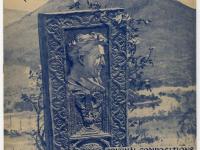Answer: The Balch Institute for Ethnic Studies.
Founded in 1971, the Balch Institute for Ethnic Studies was established to promote understanding and respect for America’s ethnic, racial, and immigrant diversity. Over its thirty-year history, the organization worked to become the premier museum and research center for scholarship on American immigrant and ethnic experiences. The Balch’s rich collections and extensive programming offered scholars and the general public access to the nation’s diverse cultural heritage. Due to financial and other issues, the Balch merged with HSP in 2002, and the society has overseen the care and use of its collections ever since.
The recently processed Balch Institute sheet music collection was formed over time by the Balch's staff. The materials in the collection date from the 1820s to the 1960s, with the bulk of the music dated from the 1890s to the 1930s. It serves as an extensive resource of songs that were published by or for members of various ethnic groups. Much of music reflects visual stereotypes and stereotypical speech patterns associated with different groups. The most prevalent materials are related to the following ethnic groups: African American, Jewish, Greek, Italian, Irish, and Swedish; however, there are smaller caches of music pertaining to other groups such as Chinese, Hawaiian, Hispanic, Romania, Russian, Slovak, and Scottish, among others.
In the Balch Institute sheet music collection (#3141), researchers will find a wide array of songs types, from spirituals and minstrel songs to folk songs, traditional anthems, and popular radio hits. The majority of music in the collection is in English, with some songs containing foreign language lyrics.

